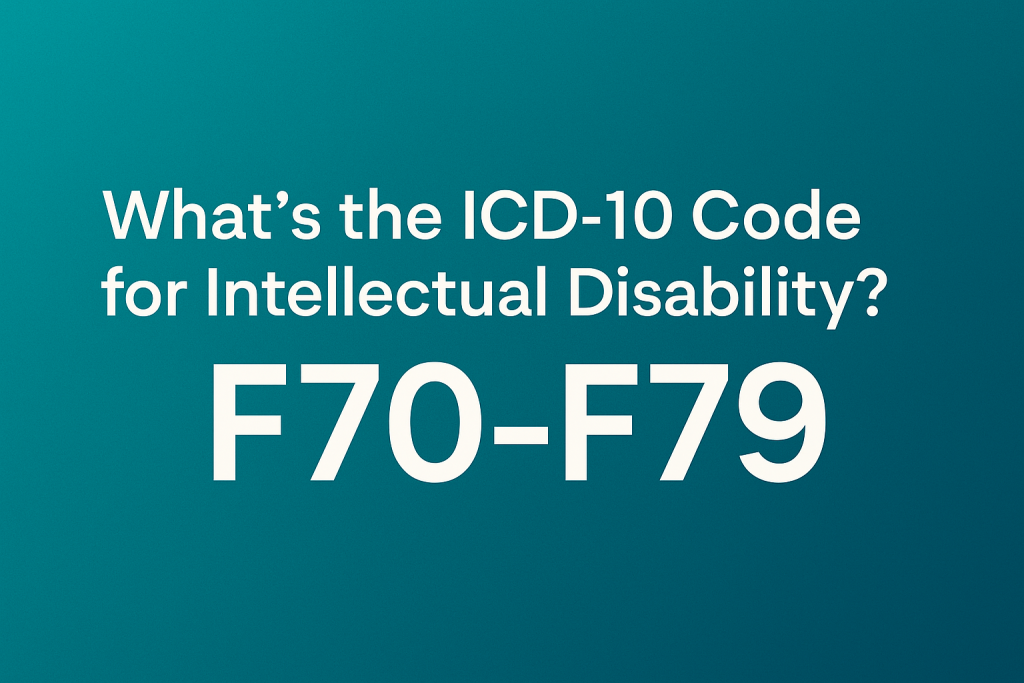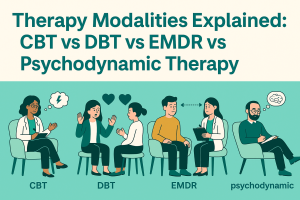What's the ICD-10 Code for Intellectual Disability? Your Complete Clinical Reference
Quick Answer: It's Not One Code - It's a Spectrum
The ICD-10 code range for intellectual disability is F70-F79. The specific code depends on severity: F70 (Mild), F71 (Moderate), F72 (Severe), F73 (Profound), F78 (Other), or F79 (Unspecified). For borderline intellectual functioning (IQ 71-84), use R41.83 instead [citation:3][citation:4].
After helping hundreds of healthcare providers optimize their coding practices, I've found that intellectual disability coding presents unique challenges that go far beyond simple code lookup. The question "What's the ICD-10 code for intellectual disability" actually has six different answers, and choosing incorrectly can lead to claim denials, compliance issues, and inadequate patient care representation.
In this comprehensive guide, we'll not only explore the complete ICD-10 code for intellectual disability spectrum but also provide clinical documentation strategies, coding pitfalls to avoid, and practical insights you won't find in basic code references. You'll learn how to accurately document severity levels, code associated conditions, and implement billing practices that withstand auditor scrutiny.
Complete ICD-10 Code Spectrum for Intellectual Disabilities
Intellectual disabilities are classified under ICD-10 chapter "Mental, Behavioral and Neurodevelopmental disorders" (F01-F99), specifically in the range F70-F79 [citation:3][citation:4]. Unlike many conditions that have a single code, intellectual disability requires careful severity assessment and code selection.
| ICD-10 Code | Severity Level | IQ Range | Prevalence Among ID Cases | Key Characteristics |
|---|---|---|---|---|
| F70 | Mild Intellectual Disabilities | 50-69 [citation:4][citation:6] | 75-90% [citation:6][citation:8] | Can achieve academic skills to ~4th-5th grade level; often live independently with minimal support [citation:6] |
| F71 | Moderate Intellectual Disabilities | 35-49 [citation:4][citation:6] | ~10% [citation:6] | Significant support needed; may develop basic self-care and communication skills [citation:6] |
| F72 | Severe Intellectual Disabilities | 20-34 [citation:1][citation:4] | ~3.5% [citation:6] | Requires extensive daily support; limited communication skills [citation:6] |
| F73 | Profound Intellectual Disabilities | Below 20 [citation:4][citation:8] | ~1.5% [citation:6] | Complete dependency for all activities of daily living [citation:6][citation:8] |
| F78 | Other Intellectual Disabilities | Varies | Varies | Includes genetic-related IDs like SYNGAP1-related intellectual disability (F78.A1) [citation:2][citation:3] |
| F79 | Unspecified Intellectual Disabilities | Not specified | Varies | Used when severity cannot be reliably determined or assessed [citation:2][citation:4] |
Critical Coding Distinction
Borderline intellectual functioning (R41.83) is explicitly excluded from intellectual disability codes and applies to individuals with IQ scores between 71-84 [citation:3][citation:4]. Using intellectual disability codes for these cases constitutes a coding error that will likely result in claim denials.
Beyond IQ Scores: Understanding the Clinical Picture
While IQ scores provide important guidance for ICD-10 code for intellectual disability selection, they represent only one component of the diagnostic picture. Modern understanding emphasizes adaptive functioning across multiple domains.
🧠 Conceptual Domain
Includes memory, reasoning, academic learning, and problem-solving. Deficits here might appear as difficulty understanding complex language or mathematical concepts [citation:6][citation:8].
🤝 Social Domain
Encompasses empathy, social judgment, communication skills, and friendship abilities. Those with intellectual disabilities often struggle with social cues and interpersonal relationships [citation:6].
🔧 Practical Domain
Involves self-care, job responsibilities, money management, and organizing tasks. Limitations here affect independent living capabilities [citation:6][citation:8].
Documentation Requirements for Accurate Coding
Proper documentation isn't just good clinical practice—it's essential for accurate coding and reimbursement. Based on current guidelines, your documentation should include these critical elements [citation:5][citation:9]:
Standardized IQ Testing Results
Document the specific assessment tool used (e.g., WAIS-IV, Stanford-Binet) and the exact IQ score. Avoid vague descriptions like "below average intelligence" [citation:9].
Adaptive Functioning Assessment
Include specific deficits in at least two adaptive domains (conceptual, social, practical) with concrete examples of functional limitations [citation:6][citation:9].
Age of Onset Confirmation
Document evidence that intellectual and adaptive deficits began during the developmental period (before age 18) [citation:6][citation:10].
Common Coding Scenarios and Solutions
Real-world coding situations often present complexities that require clinical judgment. Here are common scenarios with expert guidance:
📋 Genetic Syndromes with Intellectual Disability
Code First the genetic condition (e.g., Down syndrome Q90.9, Fragile X syndrome Q99.2), then Use Additional Code for the intellectual disability severity (F70-F79) [citation:3]. This sequencing ensures proper reimbursement and clinical accuracy.
🚸 Young Children (Under 5)
When clinical severity cannot be reliably assessed in early childhood, consider F88 - Other disorders of psychological development or F79 - Unspecified intellectual disabilities for children over 5 when assessment is difficult due to sensory or physical impairments [citation:4].
🔄 Co-occurring Autism Spectrum Disorder
Approximately 30% of individuals with ASD also have intellectual disability [citation:6]. Code both conditions: F84.0 - Autism spectrum disorder and the appropriate intellectual disability code from F70-F79. Document how each condition presents independently.
Documentation Improvement Tip
Instead of "patient has intellectual disability," document: "Patient diagnosed with moderate intellectual disability (F71) based on WISC-V IQ score of 42 and significant deficits in social and practical adaptive domains per Vineland-3 assessment." This specificity supports medical necessity and prevents audit triggers [citation:9].
Comorbid Conditions and Additional Coding
Intellectual disabilities frequently co-occur with other conditions that require additional coding for comprehensive patient representation:
| Common Comorbidity | ICD-10 Code | Coding Guidance | Prevalence in ID Population |
|---|---|---|---|
| Epilepsy and Seizure Disorders | G40.- series | Code specific seizure type; affects ~22% of ID population, up to 50% in profound ID [citation:6] | 22-50% [citation:6] |
| Cerebral Palsy | G80.- series | Code type and motor function; often associated with intellectual disability | Varies |
| Expressive Language Disorder | F80.1 | Common in intellectual disability; code as additional diagnosis [citation:5][citation:9] | High |
| Autism Spectrum Disorder | F84.0 | Code separately; approximately 30% comorbidity rate [citation:6] | ~30% [citation:6] |
What to Exclude: Differential Diagnosis
Proper intellectual disability coding requires understanding what conditions are explicitly excluded from the F70-F79 code range [citation:3][citation:4]:
Excluded Conditions and Their Correct Codes
Borderline intellectual functioning → Use R41.83 (IQ 71-84 without significant adaptive deficits) [citation:3][citation:4]
Specific learning disorders → Use F81.- series (affect specific academic domains without global intellectual impairment) [citation:4]
Major neurocognitive disorders → Use F01-F03 series (represent decline from previous functioning level) [citation:4]
Streamline Your Intellectual Disability Coding
Get expert guidance on complex coding scenarios, documentation improvement, and compliance requirements for intellectual disability and other behavioral health conditions.
Schedule a Coding ConsultationFrequently Asked Questions
What's the difference between F79 and R41.83?
F79 - Unspecified intellectual disabilities is used when an intellectual disability is confirmed but the severity level cannot be determined (e.g., due to assessment limitations). R41.83 - Borderline intellectual functioning applies to individuals with IQ 71-84 who do not meet criteria for intellectual disability and show no significant adaptive deficits. Using R41.83 when F70-F79 is appropriate (or vice versa) constitutes a coding error [citation:3][citation:4][citation:10].
When should I use F78 vs. other intellectual disability codes?
F78 - Other intellectual disabilities is used for specific situations not covered by the standard severity codes, particularly genetic-related intellectual disabilities like SYNGAP1-related intellectual disability (F78.A1) [citation:2][citation:3]. Use standard severity codes (F70-F73) when IQ and adaptive functioning clearly indicate a specific severity level, and F78 for these specialized genetic categories.
Can I code intellectual disability based on IQ score alone?
No. While IQ scores provide important guidance, ICD-10 and DSM-5 both require documented deficits in adaptive functioning across conceptual, social, and practical domains [citation:6][citation:9]. Coding based solely on IQ without adaptive behavior assessment represents incomplete clinical documentation and may trigger audit reviews.
How do I code intellectual disability with associated physical conditions?
Follow the "Code First" convention: sequence the underlying physical or genetic condition first, then add the intellectual disability code [citation:3]. For example: Q90.9 (Down syndrome) followed by F72 (Severe intellectual disabilities). This sequencing provides complete clinical picture and ensures appropriate reimbursement.
What's the proper code for historical "mental retardation" diagnosis?
The term "mental retardation" has been replaced with "intellectual disability" in clinical terminology and coding [citation:6]. For existing patients with this historical diagnosis, reassess using current criteria and code according to severity level (F70-F79). Do not use outdated terminology in current documentation [citation:4][citation:6].
Key Takeaways for Accurate Intellectual Disability Coding
Accurate ICD-10 coding for intellectual disability requires understanding both the technical coding rules and the clinical nuances of this complex condition. Remember these critical points:
Summary of Best Practices
Always document both IQ scores AND adaptive functioning deficits across multiple domains. Use specific severity codes (F70-F73) when possible rather than unspecified F79. Remember to code first any associated physical or genetic conditions, and never use intellectual disability codes for borderline intellectual functioning (R41.83) [citation:3][citation:4][citation:9].
The question "What's the ICD-10 code for intellectual disability" requires clinical judgment to select the most appropriate code based on comprehensive assessment, not just IQ scores. By implementing the documentation practices and coding strategies outlined in this guide, you can ensure accurate representation of patient conditions while maintaining compliance and optimizing reimbursement.
TherapyDial Editorial Team
This guide was developed by the TherapyDial Editorial Team, which includes certified professional coders, clinical psychologists, and healthcare practice management specialists with combined decades of experience in behavioral health coding and documentation. Our team regularly monitors ICD-10 updates and clinical best practices to provide accurate, actionable guidance for healthcare providers.




